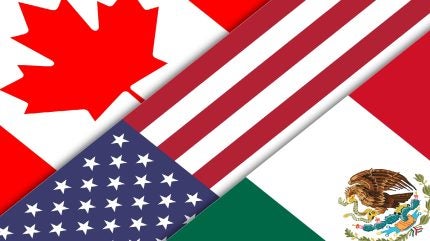
This decision, announced on social media, came just before the tariffs were scheduled to be implemented.
The postponement followed assurances from Mexican President Claudia Sheinbaum and Canadian Prime Minister Justin Trudeau regarding enhanced border security measures with the US, some of which had been previously promised.
Earlier, on 1 February, Trump had unveiled a series of tariffs targeting imports from Mexico, Canada, and China, which were expected to significantly affect the fashion industry. This development has caused considerable concern within the US fashion and retail sectors, which are already contending with high inflation and subdued consumer spending.
According to the new tariff structure, imports from Canada and Mexico were to be subject to a 25% tariff, while an additional 10% tariff will be levied on all goods imported from China.
In response to these measures, both Canada and Mexico announced reciprocal tariffs.
Prime Minister Justin Trudeau stated that Canada would impose tariffs of 25% on C$155bn (approximately £85.9bn) worth of US products as a countermeasure to Trump’s tariffs.
Similarly, President Claudia Sheinbaum instructed her economic minister to enact both tariff and non-tariff barriers as a means of protecting Mexico’s economic interests.
Mexico stands as the premier export market for US textiles, with Canada ranking third. Both countries are integral components of the North American textile and apparel coproduction chain, which sustains approximately 500,000 jobs across the US.
The three countries are signatories of US-Mexico-Canada Agreement (USMCA), which represents $12.5bn in combined US exports accounting for 53% of the nation’s total annual exports.
Tariff pause welcomed by industry
National Retail Federation Government Relations executive vice president David French said: “The announcement that tariffs for Mexico and Canada have been delayed is good news. This will allow for diplomatic solutions to be pursued in order to help stop the illegal trafficking of fentanyl into the United States as well as receiving more help from Canada and Mexico to secure our northern and southern borders. It is important that these talks continue in earnest with tangible results so that our long history of cooperation with our North American neighbours continues, and that massive new tariffs are seen only as a measure of last resort. The retail industry remains committed to working with all parties to ensure continued economic security and opportunity for the consumers we serve every day.”
The National Council of Textile Organisations (NCTO) has also commended the pause that is seen as a strategic move to bolster the US’ textile industry, which heavily relies on these nations for exporting American fibres, yarns, and fabrics.
NCTO president and CEO Kim Glas said: “We are grateful that President Trump has reached an agreement with both Mexico and Canada to pause the planned 25% penalty tariffs on their imports for one month while all parties continue to negotiate a deal to address his administration’s serious concerns.
“We fully support the President’s efforts to resolve issues related to migration and fentanyl poisoning as quickly as possible so that we can ensure a normalised trading relationship with Mexico and Canada.”
NCTO calls for higher penalties on China
In its address, the NCTO called upon the Trump Administration to:
– Significantly increase duties on Chinese imports beyond the proposed 10%, especially targeting finished apparel and textiles that constitute the bulk of China’s exports to the US.
– Abolish the de minimis tariff waiver for all countries, including Mexico and Canada. This waiver currently permits importers to evade duties on a vast array of imported goods and inadvertently facilitates the entry of illegal substances like fentanyl and products resulting from forced labour.
– Enhance customs enforcement against unlawful practices such as undervaluation and misclassification of imports, as well as transshipment designed to dodge duties.
– Implement stiffer penalties for habitual trade offenders and ensure public disclosure of violators and blacklists.
– Penalise countries that breach US trade laws by acting as conduits for illegal or subsidised Chinese materials and finished goods entering the US market.
“This is a tariff blueprint not only for textiles but for all US manufacturing. It values the North American coproduction chain that is responsible for millions of US manufacturing jobs and billions in two-way trade. Moreover, it targets the true culprit in the international trade arena—China—which has utilised state sponsored subsidies, dumping and other illegal pricing schemes, and unethical labour and environmental practices to destroy global competitors and cause massive manufacturing investment and employment to concentrate in China,” Kim Glas added.
The NCTO suggests that these measures will address trade imbalances and significantly boost revenue for the US Treasury. In fiscal year 2023 alone, $16.3bn in duties were collected from the textile sector. This figure could easily double or triple due to:
• Higher penalties on China, the largest exporter of textiles to the US, accounting for over 26% of imports in 2023, would raise billions in additional revenue.
• China avoids billions in duties as the main source of de minimis shipments, exempt from regular or Section 301 duties.
• Improved enforcement would boost collections, as China often evades tariffs through tactics like dumping, undervaluation, and transshipment.
The NCTO also emphasises that these tariff decisions are pivotal for an industry that has seen 26 plants close in just 18 months. By applying these strategies across all manufacturing sectors, tariff revenue could surge dramatically.
“We look forward to working with President Trump and his administration on these critical issues in order to bring jobs back to the US and build a stronger, more vibrant domestic supply chain in our sector and across all of domestic manufacturing as a whole,” Glas added.
Last month the NCTO welcomed the United States Customs and Border Protection’s (CBP) Notice of Proposed Rulemaking (NPRM) that seeks to revise regulations concerning the exemption for shipments of minimal value (de minimis).
Navigate the shifting tariff landscape with real-time data and market-leading analysis. Request a free demo for GlobalData’s Strategic Intelligence here.




